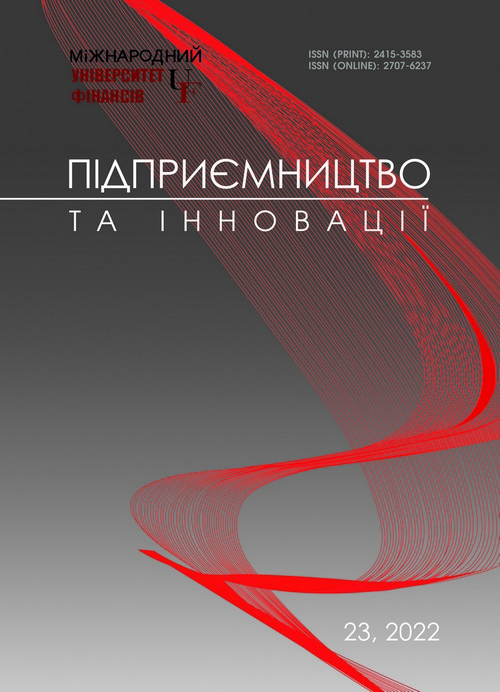STATE SUPPORT OF ENTERPRISES IN THE TOURIST INDUSTRY IN THE CONDITIONS OF MARITIME AND POST-WAR RECONSTRUCTION
Abstract
The study showed that the successful development of the tourism industry and hotel business in Ukraine requires an influx of investment, both domestic and foreign, primarily to develop the infrastructure of tourist class hotels and, in particular, small hotels and motels located on state roads, which would provide comfortable living conditions at low prices. Financing the construction of tourist accommodation should be carried out primarily by attracting extra-budgetary sources. The amount of investment required for this can be calculated based on the needs of individual regions in modern accommodation and relevant tourist infrastructure (roads, utilities, etc.). The article proves that in the post-war period in Ukraine, it is necessary to improve the current legislation on tourism development, including amendments to existing regulations in taxation, nature management, ecology and consumer protection. The theoretical and methodological basis of the study includes an abstract-logical method, methods of induction, deduction, analysis, synthesis and systematisation used to justify approaches to government support for the tourism and hospitality industry in the context of digitalisation, reflecting government support of tourism and hospitality industry.
Existing tourist facilities and resources need to be renovated. The conditions for encouraging private investment in the industry, including foreign ones, have not been created. There is an acute shortage of qualified specialists; there is a lack of systems of scientific, advertising and information support for the promotion of the national tourism product in domestic and foreign markets. Factors contributing to the development of the tourism and hospitality industry in the context of digitalisation include isolation from international technology transfer, which forces domestic businesses to implement and invest in Ukrainian products; low base effect, which allows to radically optimisation business processes through modernisation and implementation of information technology; and the prospects for changing business models that lead to the creation of new services. Given the peculiarities of digitalisation of the market and trends in the tourism and hospitality industry, we can assume that shortly this sector of the economy will reach a new level of development while acting as a catalyst for forwarding transport and logistics, mainly in the organisation of passenger traffic.
References
Bezic Н., Radic M.N. Tourism foreign directinvestment-ledd tourism gross value added: a cointegration and causality analysis of Croatian tourism. Economic Research-Ekonomska Istraživanja. 2017. Vol. 30, no. 1. P. 1443–1460. DOI: https://doi.org/10.1080/1331677X.2017.1340173 (дата звернення: 26.03.2022).
Calero C., Turner L.W. Regional economic development and tourism: A literature review to highlight future directions for regional tourism research. Tourism Economics. 2019. Volume: 26 issue: 1. P. 3–26. DOI: https://doi.org/10.1177/1354816619881244 (дата звернення: 26.03.2022).
European Commission. (2020). COVID 19 Economic package – Multiannual financial framework 2014–2020. Brussels, Belgium: European Commission.
European Court of Auditors. EU Support to tourism. Need for a new orientation and a better funding approach. 2021. 58 p.
Jégouzo L. L’évolution de la politique publique du tourisme en France. Monde du tourisme. 2019. URL: https://journals.openedition.org/tourisme/2193 (дата звернення: 26.03.2022).
Kvartalnov V.A. Tourism. Marketing of the market of consumers of tourist services. URL: https://tourlib.net/books_tourism/kvartalnov_tourism14.htm (дата звернення: 26.03.2022).
Monfererrand A., Berthonnet A., Cent ans d’organisation administrative du tourisme (1910 à nos jours). Pour mémoire № hors-série. Cedex. 2012. P. 17–27.
Novikova N.G., Lebedev K.A., Lebedeva O.E. regional tourism as a factor of socioeconomic development of the economy. Bulletin of SUSU. Series «Economics and Management». 2016. Т. 10, No 2, p. 15–21.
Ohlan R. The relationship between tourism, financial development and economic growth in India. Future Business Journal. 2017. Volume 3, Issue 1. P. 9. 22. DOI: https://doi.org/10.1016/j.fbj.2017.01.003 (дата звернення: 26.03.2022).
Валентюк І.В. Організаційно-економічні механізми державного регулювання туристичної сфери України : дис. канд. наук з держ. упр. Київ, 2005. С. 163.
Кнодель Л. В. Туризм і туристська освіта у Франції : монографія. Київ : ФОП Кандиба. 2019. 287 с.
Козловський Є.В. Організаційно-правові засади управління туристичною галуззю. Вісник НАДУ. 2005. № 1. С. 400–406.
Bezic Н., Radic M.N. (2017) Tourism foreign direct investment led tourism gross value added: a cointegration and causality analysis of Croatian tourism. Economic Research-Ekonomska Istraživanja, vol 30, no. 1, pp. 1443–1460. DOI: https://doi.org/10.1080/1331677X.2017.1340173
Calero C., Turner L.W. (2019) Regional economic development and tourism: A literature review to highlight future directions for regional tourism research. Tourism Economics, volume: 26, issue 1, pp. 3–26. DOI: https://doi.org/10.1177/1354816619881244
European Commission (2020) COVID 19 Economic package – Multiannual financial framework 2014–2020. Brussels, Belgium: European Commission.
European Court of Auditors (2021). EU Support to tourism. Need for a fresh orientation and a better funding approach. 58 p.
Jégouzo L. (2019) L’évolution de la politique publique du tourisme en France. Monde du tourisme. Retrieved from: https://journals.openedition.org/tourisme/219.
Kvartalnov V.A. Tourism. Marketing of the market of consumers of tourist services. Retrieved from: https://tourlib.net/books_tourism/kvartalnov_tourism14.htm.
Monfererrand A., Berthonnet A. (2012). Cent ans d’organisation administrative du tourisme (1910 à nos jours). Pour mémoire № hors-série. Cedex, pp. 17–27.
Novikova N.G., Lebedev K.A. & Lebedeva O.E. (2016) Regional tourism as a factor of socioeconomic development of the economy. Bulletin of SUSU. Series «Economics and Management», vol. 10, no 2, pp. 15–21.
Ohlan R. (2017) The relationship between tourism, financial development and economic growth in India. Future Business Journal, volume 3, Issue 1, pp. 9–22. DOI: https://doi.org/10.1016/j.fbj.2017.01.003
Valentiuk I.V. (2005). Orhanizatsiino-ekonomichni mekhanizmy derzhavnoho rehuliuvannia turystychnoi sfery Ukrainy: dys. kand. nauk z derzh. upr [Organizational and economic mechanisms of state regulation of the tourism sector of Ukraine]. Kyiv, 163 p. (in Ukrainian)
Knodel L.V. (2019) Turyzm i turystska osvita u Frantsii: monohrafiia [Tourism and tourism education in France]. Kyiv: FOP Kandyba, 287 p. (in Ukrainian)
Kozlovskyi Ye.V. (2005) Orhanizatsiino-pravovi zasady upravlinnia turystychnoiu haluzziu. Visnyk NADU, № 1, pp. 400–406. (in Ukrainian)



